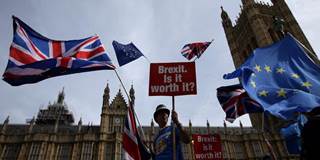Since British voters opted to take their country out of the European Union, the Brexit debate has focused largely on the economic consequences of that fateful decision. But Brexit's political implications for Europe's role in the world are far more important.
BERLIN – There are only a few months left until the United Kingdom formally exits the European Union. So far, the debate about Brexit has been framed mainly in economic terms. Should the UK crash out of the bloc without a mutual exit agreement, the damage will likely be significant. And, as matters stand, such an agreement is far from assured.
A “hard Brexit” would mean that at 11:00 P.M. (GMT) on March 29, 2019, the UK’s membership in all EU treaties – such as the customs union and single market – and international trade agreements concluded by the EU would end. Great Britain would become merely a third party, with far-reaching consequences for EU trade – not least chaos at the UK border.
But Brexit will of course have far-reaching political consequences, too. In terms of its day-to-day affairs, the EU is largely perceived as a common market and customs union. But at its core, it is a political project based on a specific idea about the European system of states. This idea – not the economics of the matter – is what Brexit is really about. And it is why the UK’s decision to leave the EU – with or without an exit agreement – will have a profound impact on the twenty-first-century European order.

BERLIN – There are only a few months left until the United Kingdom formally exits the European Union. So far, the debate about Brexit has been framed mainly in economic terms. Should the UK crash out of the bloc without a mutual exit agreement, the damage will likely be significant. And, as matters stand, such an agreement is far from assured.
A “hard Brexit” would mean that at 11:00 P.M. (GMT) on March 29, 2019, the UK’s membership in all EU treaties – such as the customs union and single market – and international trade agreements concluded by the EU would end. Great Britain would become merely a third party, with far-reaching consequences for EU trade – not least chaos at the UK border.
But Brexit will of course have far-reaching political consequences, too. In terms of its day-to-day affairs, the EU is largely perceived as a common market and customs union. But at its core, it is a political project based on a specific idea about the European system of states. This idea – not the economics of the matter – is what Brexit is really about. And it is why the UK’s decision to leave the EU – with or without an exit agreement – will have a profound impact on the twenty-first-century European order.